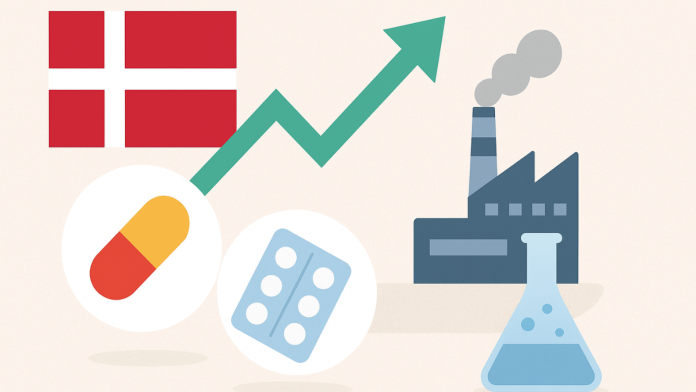Denmark’s economy staged a strong recovery in the second quarter of the year, bouncing back from a difficult start. New figures from Statistics Denmark show that the country’s gross domestic product (GDP), which measures the value of all goods and services produced, grew by 1.3% compared to the previous three months. The rebound was powered mainly by the pharmaceutical industry, as Danish drugmakers lifted production and sales to offset weakness in other sectors.
The main reason for this sudden turnaround was the strength of the pharmaceutical industry. Danish drugmakers saw a sharp rise in production and sales, helping to lift the economy. At the same time, increased oil extraction also added to the positive growth. This performance was described as a “solid positive growth surprise” by Jes Asmussen, chief economist at SJF Bank, though he also noted that challenges remain.
Without the boost from the drug industry, however, the economy would have looked very different. Statistics Denmark reported that if pharmaceuticals were excluded, Denmark’s economic output would have stayed flat in the second quarter. This highlights just how much the country depends on its drugmakers to keep the economy moving.
🇨🇭 Switzerland’s economy reels as U.S. slaps brutal 39% tariff on watches, chemicals and technology
Pharmaceuticals Take Center Stage
Drug production has become a central driver of growth for Denmark in recent years. The pharmaceutical sector, led by companies like Novo Nordisk A/S, has expanded rapidly and now plays a vital role in shaping the nation’s overall performance.
Last year, the industry was responsible for a large share of Denmark’s impressive 3.5% growth, which made the country one of the fastest-growing economies in Western Europe. But this year has been more challenging. Weaker international sales of Novo Nordisk’s weight-loss drugs, including Wegovy and Ozempic, have raised questions about the sector’s future. Competition has increased, and cheaper copycat versions of these medicines are spreading in major markets like the United States.
These challenges have already forced Novo Nordisk to lower its financial forecasts twice this year. This has sparked wider concerns inside Denmark, where many jobs and investments are tied to the pharmaceutical sector. The company directly employs more than 30,000 people in the country and was estimated to be responsible for half of Denmark’s 3.5% economic growth last year.
The latest figures show that despite these headwinds, the sector still has the power to keep Denmark’s economy afloat. For now, pharmaceuticals continue to provide the push that other industries in the country are struggling to match.
🇮🇳 Textiles to tech: How US tariffs on India threaten a $200 billion economic lifeline
Signs of Uneven Growth
While the overall numbers show a rebound, not all parts of Denmark’s economy are sharing in the upswing. Apart from pharmaceuticals and oil, many other industries are facing slower growth or even declines. Household consumption, trade, and several service sectors have not yet shown strong signs of improvement.
This imbalance has led some financial institutions to cut their forecasts for the Danish economy. Earlier this month, Nykredit A/S, one of Denmark’s largest banks, lowered its expected growth for the year from 3.5% to just 0.9%. The bank pointed directly to Novo Nordisk’s profit warning as a key factor in this downgrade.
The reliance on a single sector makes the economy vulnerable to shifts in global demand for medicines. When pharmaceutical sales rise, the country enjoys rapid growth. When they stumble, the effect is quickly felt across the economy.
For now, Denmark can take some relief in the fact that its drugmakers delivered a strong performance in the second quarter, turning what could have been another period of decline into one of growth. But the latest numbers also underline how much of the country’s economic health rests on the shoulders of Novo Nordisk and the wider pharmaceutical industry.
